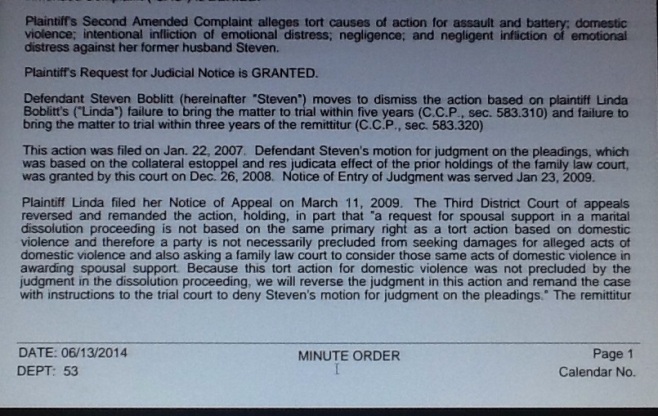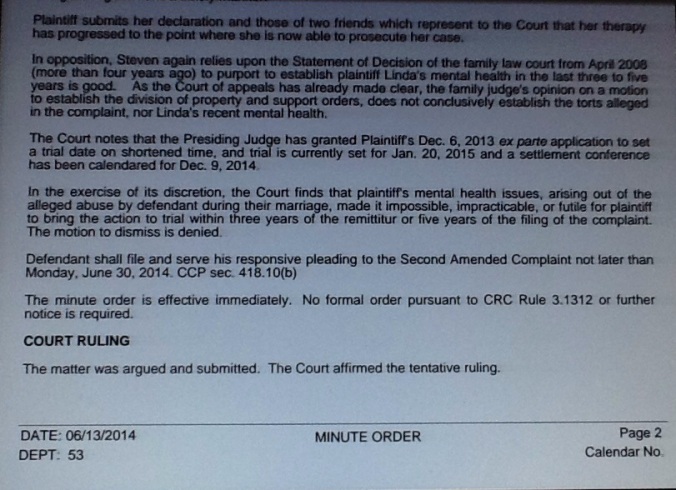When people don't hire attorneys, sometimes we have to fix everything that went wrong.
loves dog pictures (no, that is not attorney in picture)
-----------------------------------------------------------------------------------------------------------------------------A legal document preparer does not give legal advice, but may know the criteria to be addressed in a normal MSA (marital settlement agreement).......this could involve a blurb re child support, spousal, the community and separate property/division of same, seeking counsel, etc.
While some legal document preparers can do the job sufficiently, they normally charge quite a bit for a RFO (Request for Order) and to do part of the Judgment, at least in Sacramento...they are charging $750. One can go to SHARP at the Chico courthouse, or to the Oroville location, it is basically at no cost. The type of cases that can go to SHARP are mostly those with nothing to divide, no pensions, and nothing of value such as a house, timeshare, stock portfolio, separate property assets used to obtain community assets and other related financial issues.
Child custody issues which involve contested financial issues are usually better done in court, because SHARP cannot give legal advice. Cases where the parents have problems and are extremely high conflict may end up with the Court assigning a third party to represent the child or children.
HOWEVER if the spouse who paid the document preparer fails in some other area such as those below, then just about anything can happen---most of it being bad, and costly! Only an attorney can fix all that went wrong, since the document preparer cannot practice law.
IMPROPER HANDLING OF FINANCIAL DISCLOSURES IS COMMON BECAUSE
ONE SPOUSE NORMALLY WILL TAKE ADVANTAGE OF THE OTHER SPOUSE!
EXAMPLES OF WHAT CAN GO WRONG ESPECIALLY IF DONE ON PURPOSE*
Note-if done on purpose, there is only so much time to discover whatwas done wrong according to the Family Law Code in California........
usually requiring setting aside a judgment......
https://codes.findlaw.com/ca/family-code/fam-sect-2122.html
Below are only possible problems and some may not require an actual set-aside BUT will
require some legal vehicle to try and fix the issue (I am not including appeals in this..) therefore
it's unlikely you would know what type of legal maneuver would be required and an attorney
would be required to view the entire case file.
- Declaration of Disclosures-- done improperly...for example, not even filled in?!
- Pension plans, 401K or ERISA plans...given away in "settlement" without regard for valuation and tax ramification, or income levels, or anything else!!
- Actual Separate Property Disclosure not done...at all...no valuation, no appraisal, and no
- knowledge by Judge as to how separate property (especially underwater property) is handled--this is a huge issue whenever real estate pricing is depressed because eventually it all comes
- back up....
- Actual community property Disclosure misrepresented purposely
- Spousal support and Jurisdiction, other spouse cut off? Long term marriage?
- Fraud or Misrepresentation in any of the areas represented, normally financial? There are TIME LIMITS for most of these issues [usually based on a time certain or knew or should have known]
- Actual Fraud by Telling Spouse not to Attend Hearing, Then Going to Hearing? and
- Wiping Out Spouse on Purpose?
- Failure to Obtain Valuation of Home Correctly, especially prior to trial...huge mistake
- Home under water valuation and FC2640 Issues, where huge CASH is put down by one party only, home given to party that didn't own the house on title (at pro se trial, no one was represented; judge awarded wrong party the house) post judgment RFOs failed, and client can't afford an appeal and never got what he/she was supposed to get as far as household property, thus client lost everything
- Waivers which were not done, creating more issues on division of property; technically, any property deemed separate when later commingled creates issues of waiver, notice and far more and brings up a ton of issues requiring not only tracing, but factual disputes and things that parties probably don't want to make public
- Commingling of separate/community assets, creating more tracing issues; and when done improperly, because no one kept any paperwork, can create huge liability or windfall to a party
- Failure to Trace source of Assets Correctly, creating trial issues
- Selling off Residence Then Claiming there was no money and never listing it on any
- documents like the FL-142? Failing to do the Disclosures correctly and purposely
- not listing household items or anything else for that matter?
- Eliminating Spousal support by claiming the spouse is self-supporting when spouse has never worked during the marriage and still doesn't work?
- Having a private mediator for both parties and an agreement therein, then years later
- the ex spouse welches on the case and doesn't follow the order..this is an expensive task
- and likely the offending party would be in contempt, but not for certain
CALL ATTORNEY TODAY IF YOU HAVE PROBLEMS COVID HOURS 7am-7pm
You can leave a message anytime!


















